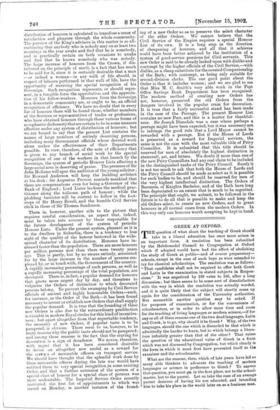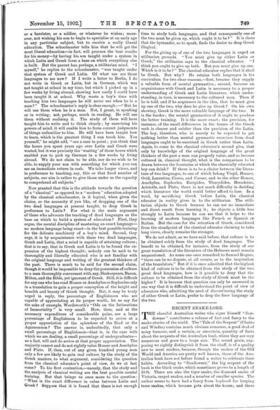GREEK AT OXFORD. T HE question of what share the teaching
of Greek should take in a liberal education has once more arisen in an important form. A resolution has been submitted by the Hebdomadal Council to Congregation at Oxford which if adopted would have had the effect of abolishing the study of Greek at public—and of course preparatory— schools, except in the case of such boys as were intended to try for classical scholarships. The resolution was as follows: " That candidates shall not be required to offer both Greek and Latin in the examination in stated subjects in Respon- sions." It was negatived by 189 votes to 166, after a long discussion ; but there seems to be some sort of dissatisfaction with the way in which the resolution was actually worded, and it is quite likely that the subject will shortly come up again for the consideration of the University authorities. But meanwhile another question may be asked. If for purposes of examination, or for the convenience of schoolmasters, or in order to allow more time and room for the teaching of living languages or modern science,—if for any or all of these reasons one of the two dead languages, Latin and Greek, is to go, why should it be Greek P Why, of the two languages, should the one which is discarded be that which is admittedly the harder to learn, but to which belongs a litera- ture infinitely greater than that of the other? That raises the question of the educational value of Greek in a form which was not discussed by Congregation, but which clearly is the form in which it must first have presented itself to the examiner and the schoolmaster.
What are the reasons, then, which of late years have led so many able thinkers to advocate the teaching of modem languages or science in preference to Greek P To answer that question, you must go, in the first place, not to the school- master, but to the parent. Let us take the case of an average parent desirous of having his son educated, and intending him to take his place in the world later on as a business man.
or a barrister, or a soldier, or whatever he wishes ; more- over, not wishing his son to begin to specialise at an early age in- any- particular subject, but to receive a really liberal edUc.ation. The schoolmaster tells him that he will get the most liberal education—in fact, will procure the best results for his money—by having his son taught under a system in which Latin and Greek form a base on which everything else is built. But the parent has, perhaps, a utilitarian mind. " I myself," he replies to the schoolniaster, " was taught under that system of Greek and Latin. Of what use are those languages to me now P If I write a letter to Berlin, I do not write in Greek or Latin, but in German, which was not taught at school in my time, but which I picked up in a few weeks by living abroad, showing how easily I could have been taught it at school. Why waste a boy's time with teaching him two languages he will never use when he is a man?" The schoolmaster's reply is clear enough :—" But he will use them when he is a man. Not, I grant, in speaking or in writing; not, perhaps, much in reading. He will use them without realising it. The study of them will have taught him to write and to think clearly ; by exercising his powers of mind, it will enable him to form correct judgments of things unfamiliar to him. He will have been taught how to learn, which is the greatest thing I can teach him. You yourself," he might add, " are a case in point ; you think that the hours you spent years ago over Latin and Greek were wasted, but it was precisely the `wasting' of those hours which enabled you to pick up German in a few weeks by living abroad. We do not claim to be able, nor do we wish to be able, to supply your• son with something for which you can see an immediate return in cash. We take longer views, and in preference to teaching, say, this or that fixed number of subjects, our aim is rather to give those under us the capacity to comprehend all subjects."
Now granted that this is the attitude towards the question of a " classical " as opposed to a " modern- education adopted by the classical schoolmaster, is it logical, when given the choice, or the necessity if you like, of dropping one of the tem dead languages at present taught, to drop Greek in preference to Latin ? For what is the main argument of those who advocate the teaching of dead languages as the base on which to build a system of education ? First, they argue, the mental discipline of mastering an exact language— no modern language being exact—is the best possible training for the delicate machinery of a boy's mind. Second, they urge, it is by acquaintance with these two dead languages, Greek and Latin, that a mind is capable of attaining culture ; that is to say, that in Greek and Latin is to be found the ex- pression of the highest thought; nobody can be said to be thoroughly and liberally educated who is not familiar with the original language and writing of the greatest thinkers of the past. There is much to be said for the second claim, though it would be impossible to deny the possession of culture to a man thoroughly conversant with, say, Shakespeare, Bacon, Milton, and the Bible, yet ignorant of Greek. Still, it is difficult for any one who has read Homer or Aeschylus or Sophocles only in a translation to gain a proper conception of the height and breadth and beauty of Greek thought. But, it may be truly urged in reply, the percentage of Englishmen who are capable of appreciating at its proper worth, let us say for the sake of example, Wordsworth's " Ode on the Intimations of Immortality " is very small. How, then, and at the necessary expenditure of considerable pains, are a large percentage of Englishmen to be expected to arrive at a proper appreciation of the splendour of the Iliad or the Agamemnon ? The answer is, undoubtedly, that only a small percentage of Englishmen—that is, in the case with which we are dealing, a small percentage of undergraduates— as a fact, will and do arrive at that proper appreciation. The majority cannot and do not rightly value Homer and Aeschylus and Plato. If, then, out of any given hundred young men only a few are likely to gain real culture by the study of the Greek masters, to what argument, considering the question from the classical educator's point of view, do we at last come? To his first contention,—namely, that the study and the analysis of classical writing are the best possible mental training. But that brings us once more to the question : " What is the exact difference in value between Latin and Greek P Suppose that it is found that there is not enough
time to study both languages, and that consequently one of the two must be given up, which ought it to be ? " It is there that the bystander, so to speak, finds the desire to drop Greek illogical.
For the giving up of one of the two languages is urged on utilitarian grounds. " You must give up either Latin or Greek," the utilitarian says to the classical educator. " I think you ought to give up both. But you must give up one. Which is it to be ? " The classical educator replies that it shall be Greek. But why ? He retains both languages in his curriculum for two clear reasons,—first, because they supply a valuable form of mental gymnastics ; second, because an acquaintance with Greek and Latin is necessary to a proper understanding of Greek and Latin literature, which under- standing, in turn, is necessary to the cultured man. Then if he is told, and if he acquiesces in the idea, that he must give up one of the two, why does he give up Greek ? On his own showing, Greek is the more valuable language of the two. It is the harder; the mental gymnastics of it ought to produce the better training. It is the more exact; the precision, for instance, of the small differences in the tenses of the Greek verb is clearer and subtler than the precision of the Latin. The boy, therefore, who is merely to be expected to get nothing better than mental gymnastic exercises from dead languages ought to be exercised in Greek rather than Latin. Again, to come to the classical educator's second plea, that only by knowledge of the original language of the great thinkers of the past a man can properly value, and so become cultured in, classical thought, what is the comparison to be drawn between the fountains at which the classically educated boy can drink ? If there is to be a choice between the litera- ture of two languages, to one of which belong Virgil, Horace, Ovid, Lucretius, Cicero, and Caesar, and to the other Homer, Aeschylus, Sophocles, Euripides, Thucydides, Herodotus, Aristotle, and Plato, there is not much difficulty in deciding which literature the world could better afford to lose. In a word, by sacrificing Greek before Latin, the classical educator in reality gives in to the utilitarian. The utili- tarian objects to Greek- because be can see no immediate and direct result from learning it ; he objects a little less strongly to Latin because he can see that it helps to the learning of modern languages like French or Spanish or Italian. But the case for the retention of. Greek, considered from the standpoint of the classical educator claiming to take long views, clearly remains the stronger.
We do not admit, as we have said before, that culture is to be obtained solely from the study of dead languages. The benefit to be obtained, for instance, from the study of our great translation of the literature of the Hebrews must remain unquestioned. As some one once remarked to Samuel Rogers, "there can be no dispute, at all events, as to the inspiration of the translators." But if it is once admitted that the highest kind of culture is to be obtained from the study of the two great dead languages, how is it possible to deny that the culture to be obtained from the study of Greek must be the higher ? It is because that question can only be answered in one way that it is difficult to understand the point of view of educators who, admitting the need of discontinuing the study of either Greek or Latin, prefer to drop the finer language of the two.























































 Previous page
Previous page